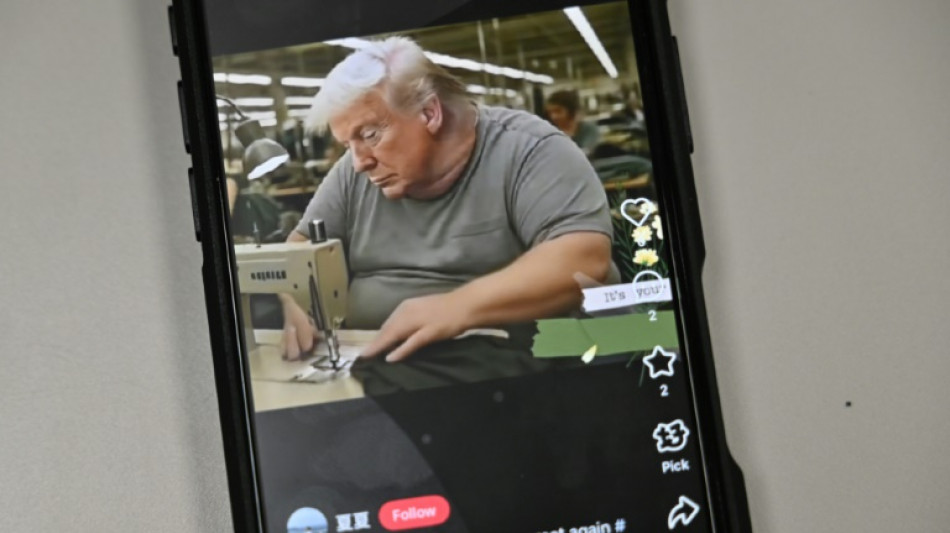

Chinese vent anger at Trump's trade war with memes, mockery
While China's leaders use their economic and political might to fight Donald Trump's trade war "to the end", its army of social media soldiers are embarking on a more humorous campaign online.
The US president's tariff blitz has seen Washington and Beijing impose eye-watering duties on imports from the other, fanning a standoff between the economic superpowers that has sparked global recession fears and sent markets into a tailspin.
Trump says his policy is a response to years of being "ripped off" by other countries and aims to bring manufacturing back to the United States, forcing companies to employ US workers.
But China's online warriors have been taking advantage of the massive strides in artificial intelligence to create memes highlighting that many of the goods bought by Americans such as shoes and smartphones are made using cheap Chinese labour.
Defiant posts have shot to the top of most-searched lists on social media, flooding platforms with patronising comments and jokes.
In one video, a Chinese internet user opens his hands to reveal what goods he buys from the United States -- nothing.
His dozens of videos railing against the United States have accumulated tens of millions of views on TikTok, officially blocked in China but accessible through a virtual private network (VPN).
"Donald Trump started a trade war, so... F*** MAGA," he says in one video, referring to Trump's campaign slogan of Make America Great Again.
- 'Two-faced behaviour' -
The user, based in northeastern China's Liaoning province and who asked to be identified by his online persona "Buddhawangwang", told AFP the posts were a way of "venting my anger".
The 37-year-old poster said he moved to California in 2019 but "threw away" his green card four years later -- angry over "prejudices against China".
That included "fake news" about Xinjiang, the far-western region where Beijing is accused of widespread human rights abuses against minorities. China denies the claims.
Now, he feels vindicated in his quest to "debunk Western propaganda".
For many in China -- whose status as "the world's factory" fuelled its meteoric rise as an economic superpower -- the idea of Americans making their own shoes or phones is laughable.
AI-generated videos putting Trump, US Vice President JD Vance -- who sparked outrage with comments referring to "Chinese peasants" -- and tech mogul Elon Musk on footwear and iPhone assembly lines quickly went viral.
Others show rows of befuddled overweight shophands fiddling with sewing machines as Americans make clothes, shoes and electronic devices.
The alleged hypocrisy of US officials railing against China while enjoying the fruits of globalisation has also been targeted.
One post traced a dress worn by White House press secretary Karoline Leavitt to Chinese online shopping platform Taobao.
"Attacking 'Made in China' is work; enjoying 'Made in China' is life," one comment read.
"Two-faced behaviour. Don't wear it then, don’t use it," another said.
Another post shared by Beijing's foreign ministry spokeswoman Mao Ning showed Trump's trademark "MAGA" hat marked "Made in China" -- with a price tag indicating an increased cost.
- 'Made in China' -
Elsewhere, Chinese users have taken to TikTok to show Americans how they can get around the swingeing tariffs -- going to China and buying goods straight from the source.
In one, a man in a warehouse claiming to work at a factory making Birkenstocks in the eastern hub of Yiwu sold pairs of the iconic sandal for just $10.
"We have seven colours," he says, pointing to multiple pairs of shoes displayed on a cardboard box with the words "Made in China" printed on it.
"If you need, please contact me," he added, gesturing towards stacks of boxes behind him.
"There certainly is nationalism here," Gwen Bouvier, a professor at Shanghai International Studies University who researches social media and civic discourse, told AFP.
The videos make "fun of how rude JD Vance is and, by extension, the Trump administration", Bouvier said -- a timely clapback against the vice president's "peasants" comments.
But beneath the humour there is likely deep concern over the impact of the trade war on China's export-dependent economy.
Censors on the country's strictly regulated internet appear to have scrubbed out narratives that warn of the effects they may have on Chinese consumers and manufacturers.
On China's X-like Weibo platform, all comments under the hashtag "The United States will impose a 104% tariff on Chinese goods" have been removed.
By contrast, the hashtag "America is fighting a trade war while begging for eggs" -- a reference to soaring prices for the kitchen staple -- was viewed 230 million times.
W.Vidal--GM



